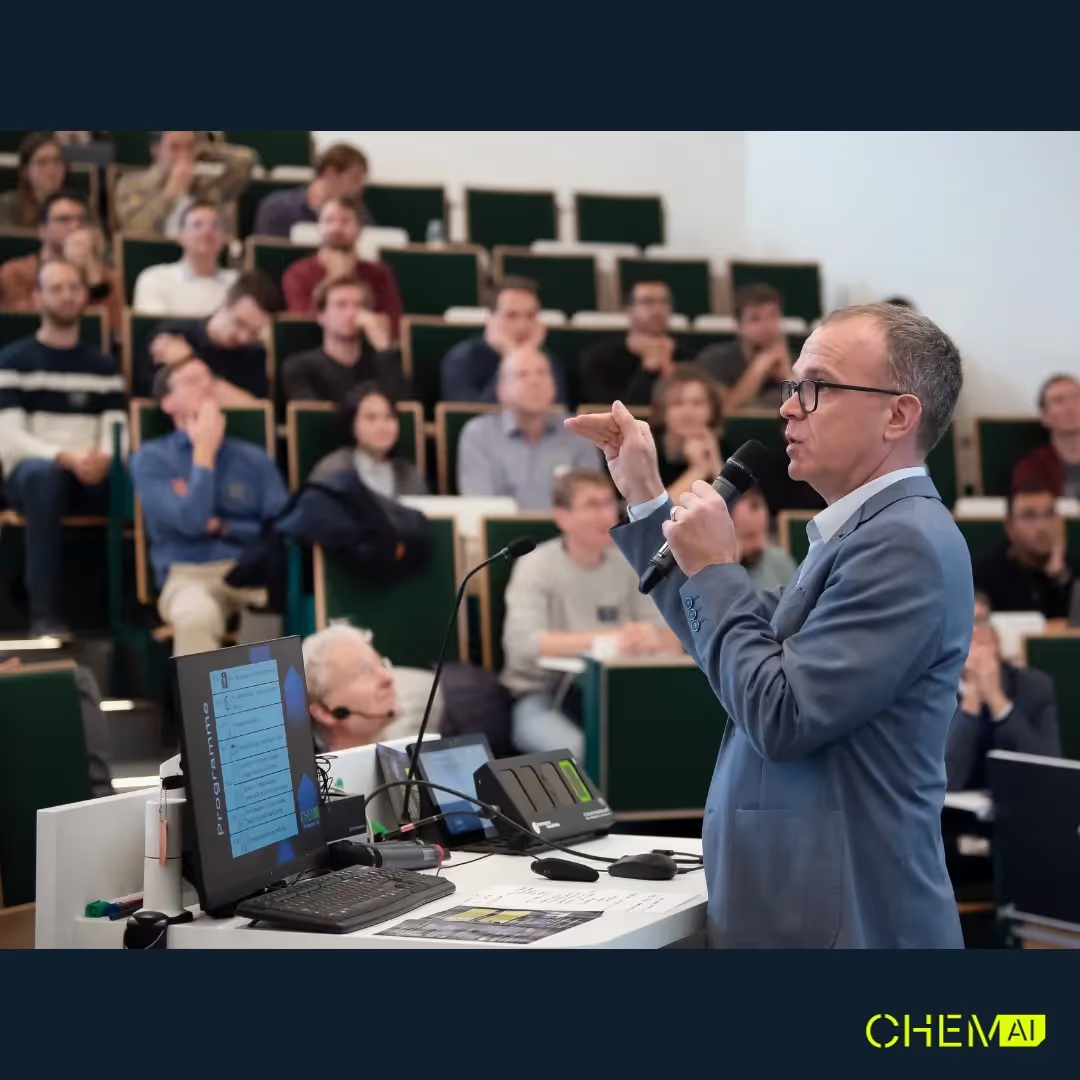The first edition of ChemAI is a wrap!

ChemAI 2023: Recap and highlights
The first edition of ChemAI was a success, beyond the organizers' expectations! More than 200 attendees, academics and companies, gathered around a climate of open networking and thought-provoking conversations. The passion and engagement in the room were amazing to see.
The recent ChemAI event put attention on the emerging world of AI applications developed for chemists, giving life to a groundbreaking convergence of science and technology, of computer science and chemistry, of academia and business. New collaborations and Public Private Partnerships among the attendees are expected to start in the near future, to tackle some of the most pressing challenges around digitalization and sustainability in chemistry and life sciences.
Keynote 1
The day unfolded with a series of enlightening keynotes and workshops that lef inspired and fueled with fresh perspectives. Industry leaders and professors took the stage, exploring the potential of ChemAI and its transformative impact on the field of chemistry. Prof. Max Welling (UvA / ex Microsoft) discussed what AI can do for Chemistry, and what Chemistry can do for AI, unveiling the subtle but fundamental similarities between the laws underpinning these two fields.
Keynote 2
Prof. Matthias Beller, director of the Leibniz Institute for Catalysis in Germany, explained the pivotal role that chemistry, and especially catalysis, will play in facing the “grand challenges” ahead of our society. Catalysis represents the most powerful way of reducing the energy intensity of many industrial processes, and it’s also the perfect field for Data Science, Mathematics, Biotechnology, and Material Science to work together with AI and Chemistry on concrete solutions.
Company fashion Show
The event provided a platform for innovative businesses to shine, allowing them to pitch their groundbreaking products and services in front of an eager audience. During a 45-minute Company Fashion Show, nine startups and SMEs offered their short presentations, and even more companies joined the following 1-hour exhibition with a stand.
Best Poster Awards
The event was not just a showcase; it was an arena for collaboration and recognition. Three Best Poster Awards were granted to young researchers after the poster session and a public vote, thanks to the generous sponsorship from SCM and Screening Devices. This injection of support added a competitive edge to the event, encouraging more than 20 participants to present their cutting-edge research with enthusiasm and expertise. Congratulations to the winners: Thor van Heesch (1st prize - photo), Jacobus Dijkman (2nd prize), and Adarsh Kalikadien (3rd prize).

Workshop 1
The workshop on "Language Models for Life Sciences" immersed participants in the realm of natural language processing, explaining how syntax and semantics can be applied to molecules, and showed its transformative applications in life sciences. Key takeaways: generative modeling and transformers are achieving new breakthroughs in chemistry. NVIDIA BioNeMo, a cloud-managed service will offer the best tools for computer-aided drug discovery, easily accessible online.
Workshop 2
The "AI-Driven Chemical Robotics" workshop showcased the fusion of artificial intelligence and robotics to reshape the landscape of chemical experimentation. IBM elucidated how their “Lab that Learns” cutting-edge technologies are streamlining traditional laboratory processes, enabling researchers to conduct experiments and collect data with unprecedented speed and accuracy. On the same page, the Netherlands is investing almost 100 million euros in “Big Chemistry”, to build a RobotLab Central facility and an innovation ecosystem all around it.
A key moment of the event lies in the vibrant discussions among the panelists during the conclusion of the day. Prof. Matthias Beller, Prof. Paola Gori-Giorgi (Microsoft), and Christian Dallago (NVIDIA) elaborated on three strategies to overcome the issue of limited, small, and biased chemical data. Topics like synthetic data, foundation models, and frameworks for data management offered insights that added depth to the dialogue. Diverse viewpoints, expert opinions, and innovative ideas collided, creating an atmosphere charged with intellectual curiosity.

Sponsorship
This first ChemAI edition was an experiment, and we're excited to announce that we'll be hosting ChemAI again in November 2024. However, to keep the momentum going and make the event even better, we need your support. If you or your organization are interested in sponsoring ChemAI 2024, please contact us at info@acnetwork.nl

A full gallery of pictures is available here.
























